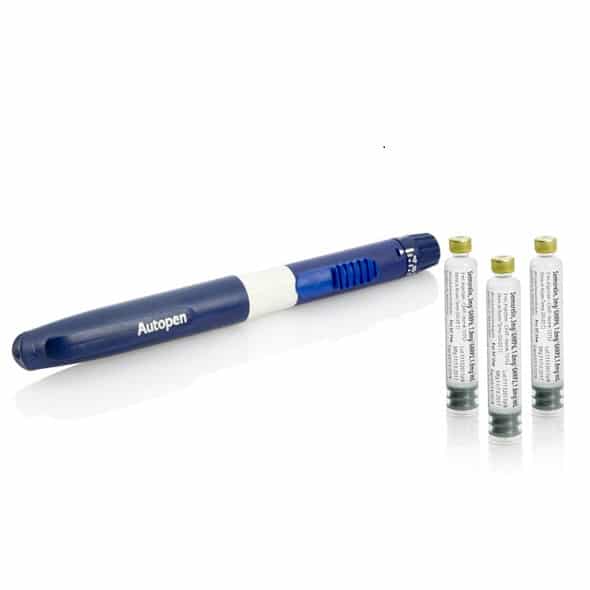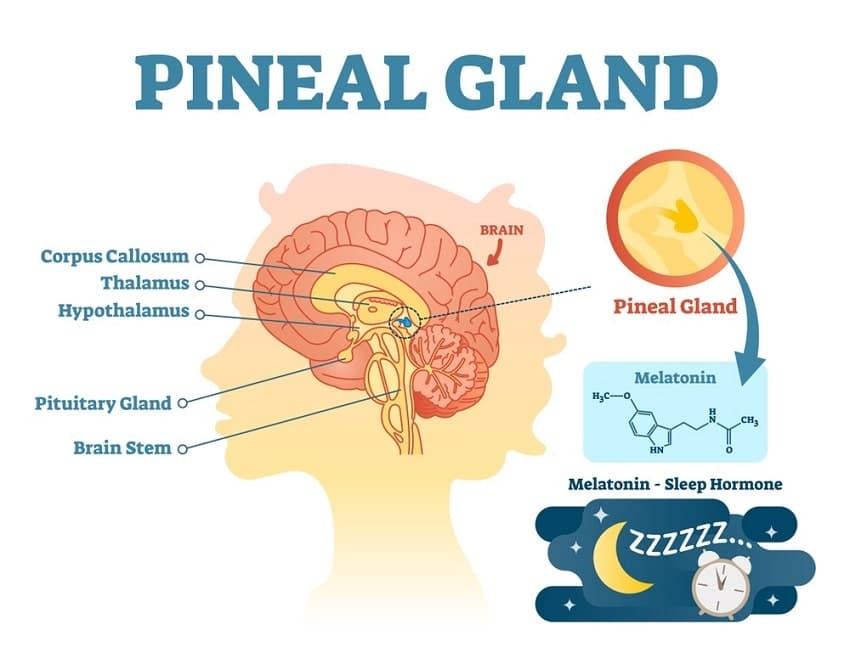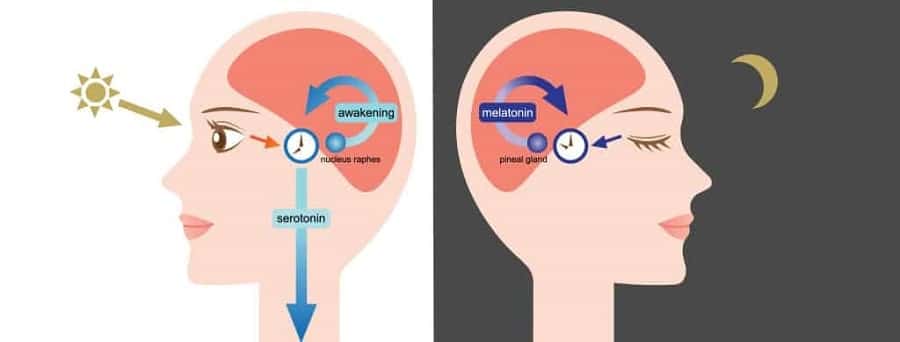
Does Melatonin Boost Growth Hormone (HGH) Secretion?
Table of Contents
- Melatonin: Definitions, Function, Secretion
- HGH, Melatonin, and Sleep
- The Relationship Between Serotonin and Melatonin
- Do Melatonin and Serotonin Increase Growth Hormone?
- Common Issues With Melatonin and HGH Production
- Can Melatonin Supplementation Boost HGH Secretion?
- Natural Ways to Boost Melatonin for Greater HGH Secretion
- FAQs About Melatonin
The hormone melatonin has a unique an important relationship with human growth hormone (HGH), the crucial anabolic protein produced by the pituitary gland to foster muscle and bone strength, regulate metabolism, and maintain high energy levels. Below, you will find everything you need to know about melatonin and how it affects HGH levels.
Melatonin: Definitions, Function, Secretion
The pineal gland (so named because of its striking visual resemblance to a pinecone) in the middle section of the brain produces melatonin. Melatonin is widely known as the “sleep hormone” due to its tight-knit relationship with sleep quality. Much research in recent decades, for example, shows that melatonin levels are significantly lower in individuals with insomnia (a chronic inability to fall asleep) compared to non-insomniacs.
Night-shift workers who typically go to work around midnight and finish in the early morning also experience difficulty falling asleep during the day, likely due to disruptions in the pineal gland’s timing of melatonin production and release.
In the body, melatonin is also responsible for blood pressure regulation and antioxidant activities. As we will explore later, melatonin interacts significantly with other important hormones in the body, most notably HGH.
HGH, Melatonin, and Sleep
One of the primary functions of melatonin is the regulation of the circadian rhythm. Melatonin is released in heaviest doses at nightfall as the mind prepares for sleep. The retinas (eyes) sense a decline in light. That information is then relayed through the hypothalamus region to the ganglia and then onto the pineal gland, which takes its cue to begin release greater amounts of melatonin. Blood levels of melatonin, in fact, are nearly undetectable during the day.
The circadian rhythm, in addition to regulating melatonin supplies, also dictates also HGH release. Although HGH is pushed into the blood supply regularly throughout a 24-hour circadian period, the pituitary gland releases the maximum amount of HGH during sleep.
HGH release peaks at rest partly due to melatonin’s stimulating effect. Study after study shows that melatonin supplementation causes a reliable spike in HGH secretion in adult test subjects. This effect is mediated by the hypothalamus region of the brain and the greater hypothalamic-pituitary-adrenal axis (HPA axis).
Later on, we will explore the possible supplementation protocols that can increase melatonin levels and, in turn, trigger greater HGH production by the pituitary gland for long-term hormonal gains.
The Relationship Between Serotonin and Melatonin
Serotonin is derived from tryptophan, an essential amino acid. Serotonin, in turn, is a precursor molecule for melatonin, meaning that it is required for melatonin synthesis. Serotonin, unlike melatonin, is a pure neurotransmitter. This means that serotonin’s primary role is to mediate signals and coordinate activities between neurons (brain cells). Melatonin has properties similar to a neurotransmitter but is considered a hormone due to its broader set of functions in the body.
Serotonin and melatonin exert opposite effects. Whereas melatonin prepares the body for rest, serotonin energizes the body to prepare for an active day. Conceptually, it might be helpful to think of the pair as “night” and “day” or “yin” and “yang.”
The body attempts to achieve equilibrium (balance) between the two hormones as part of maintaining homeostasis. This is why depressed individuals (especially in cases due to serotonin deficiency) frequently develop insomnia as a primary symptom of their condition.
Likewise, patients prescribed serotonin-boosting serotonin reuptake inhibitors (SSRIs) to treat depression often experience melatonin-related sleep disturbances as a result.
Do Melatonin and Serotonin Increase Growth Hormone?
Both melatonin and serotonin play important roles in the secretion of growth hormone.
Serotonin plays a central role in the regulation of HGH release in combination with melatonin due to “highly significant increases in 5-hydroxyindole acetic acid (5HIAA) concentrations and in ratios of 5HIAA to serotonin (5HT)… suggesting a serotonergic component to melatonin-induced increase in GH.”
Because “serotonin has also been implicated as the stimulus for secretion of growth hormone after the onset of slow-wave (non-rapid eye movement, NREM) sleep in normal humans,” balancing serotonin and melatonin is critical if you are in an at-risk group for HGH-related hormone imbalance (see section below).

Common Issues With Melatonin and HGH Production
Issues with melatonin that can interfere with HGH production can occur in:
- Anyone experiencing jet leg (clinically known as circadian desynchrony).
- Delayed Sleep-Wake Phase Disorder (DSWPD).
- Shift workers.
- Clinically depressed individuals.
- Individuals taking SSRI medications for the treatment of depression, anxiety or other neurochemical imbalances.
- The visually impaired (due to disrupted circadian rhythm.
Can Melatonin Supplementation Boost HGH Secretion?
The researchers of one study into the melatonin-HGH interplay concluded that “it is difficult to characterize the relationship between melatonin and GH in healthy individuals; however, the administration of intravenous melatonin stimulates GH secretion in normal adults.”
Further research into the complex relationship between melatonin and HGH is ongoing. Nonetheless, melatonin is essential for HGH production and release. The bottom line is that melatonin supplementation produces increases in circulating levels of HGH with minimal risk of serious side effects.
Natural Ways to Boost Melatonin for Greater HGH Secretion
Melatonin in supplement form is generally safe. However, if you are unable to take melatonin supplements or are more interested in natural ways to boost melatonin, here are the most effective lifestyle and dietary interventions to make:
- Consume foods that are naturally high in melatonin such as tart cherries, sweet potato, asparagus, and olives.
- Limit caffeine intake and stop caffeine consumption after 2 pm.
- Dim the lights in your home (or wherever you are) beginning 2-3 hours before bedtime.
- Avoid blue light exposure. Not all light sources are equal in terms of their impact on melatonin. In fact, lights on the blue wavelengths of the spectrum (the types of lights on cell phones, tablets, laptops, and similar devices) are the most disruptive for sleep.
- Practice relaxation techniques. Meditation, controlled breathing, yoga, and similar practices have enormous benefits for overall hormone health and melatonin release in particular.
- Inhale lavender before bed. Far from being an “old wives’ tale,” lavender does actually stimulate overall relaxation, specifically through greater release of melatonin.
- Set aside 7-9 hours of uninterrupted sleep time beginning at the same time each night. This is by far the most important practice that you can use to develop a healthy circadian rhythm and optimize melatonin and HGH levels.
FAQs About Melatonin
Below you will find commonly asked questions and their answers regarding melatonin.
Does Diet Increase Melatonin?
You can achieve modest gains in melatonin through diet alone by including more foods that stimulate greater melatonin release. These include:
- Asparagus.
- Sweet potatoes.
- Tart cherries.
- Nuts and seeds.
- Pomegranate.
- Tomatoes.
Does Melatonin Cause Weight Gain?
Melatonin supplementation has not been shown to cause or contribute to weight gain. On the contrary, low levels of melatonin are associated with decreased appetite and resulting weight gain.
What Are the Negative Side Effects of Melatonin?
Most people tolerate melatonin well because it is a naturally occurring hormone. Therefore, the risk of side effects is lower in melatonin supplementation than with many commonly used pharmaceutical medications. However, melatonin supplementation does cause the following side effects in a small minority of people who take it:
- Headache.
- Dizziness.
- Nausea.
- Drowsiness.
Melatonin can also interfere with certain types of medications, potentially producing harmful side effects. The medications that melatonin negatively interacts with include:
- Anticonvulsants.
- Sleep aids/sedatives (including Xanax, Valium, and Ambien).
- Contraceptive drugs (i.e., birth control pills).
- Anticoagulants.
- Diabetes medications.
- Imunnosuppresants.
Make sure that you discuss potential melatonin supplementation with your doctor before beginning a dosing regimen to ensure that your current medications will not be affected. The optimal dosage for melatonin may be between 3-5 grams. However, as a general guideline, begin supplementation with a small dose (1 gram) and then work your way up to a higher dosage to produce the optimal effect.
As always, an experienced endocrinologist (hormone doctor) is best suited to determine the right individual melatonin dose for you and guide you throughout the process.
Can Melatonin Damage Kidneys?
Melatonin is safe for the kidneys in moderate doses. In fact, good evidence indicates that melatonin’s antioxidant activity may protect the kidneys: “Melatonin administered exogenously exercises antioxidant effects that ameliorate intrarenal RAS activation and renal injury in chronic progressive CKD animal models.”
Many healthcare practitioners treating patients with kidney disease now administer/recommend melatonin as an alternative treatment option.
Can Melatonin Stop Your Heart?
No, melatonin does not stop the heart or cause any adverse heart-related events. On the contrary, melatonin is beneficial for heart health: “Melatonin, via its antioxidant, anti-inflammatory and immunomodulatory properties protects against ischemic heart disease as well as subsequent ischemic heart failure characterized by myocardial cell death (necrosis, apoptosis, autophagy) and cardiac dysfunction.”
Is Melatonin Bad for Your Liver?
No, melatonin is not bad for your liver. Once again, the opposite is true. Melatonin is liver-protective: “Melatonin reduced liver injury and inflammation through decreasing serum ALT/AST levels, inhibiting pro-inflammatory cytokine production, preventing NOD-like receptor pyrin domain containing 3 (NLRP3) inflammasome activation, ameliorating oxidative stress, and attenuating hepatocyte death.”
Unless you have a chronic liver condition or impaired liver function, you likely do not need to worry about potential liver damage resulting from melatonin supplementation.
How Does Melatonin Affect the Brain?
Melatonin exhibits neuroprotective properties in humans, meaning that it protects the brain. For example, in its role as an antioxidant, melatonin may slow or prevent the development of Alzheimer’s disease and other neurodegenerative conditions. In addition to being neuroprotective, melatonin also boost neuroplasticity, meaning the brain’s ability to adapt and change with new conditions and information – an important tool for healthy aging in the brain.



